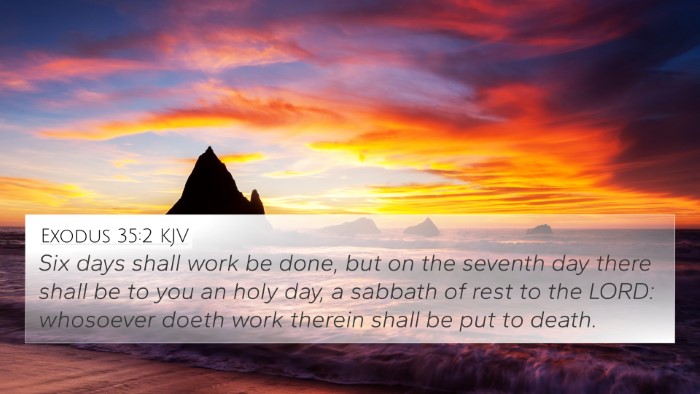Understanding Leviticus 16:31
Leviticus 16:31 states: "It is a sabbath of rest unto you, and ye shall afflict your souls, by a statute forever." This verse is nestled within the context of the Day of Atonement (Yom Kippur), a sacred observance in which the Israelites were commanded to humble themselves and seek forgiveness for their sins.
Summary of Leviticus 16:31 Meaning
This command emphasizes the importance of rest and repentance as key spiritual practices. It places a significant focus on the inner condition of the heart, urging believers to engage in spiritual reflection and humility.
Matthew Henry's Commentary
Matthew Henry notes that this verse highlights the need for a "sabbath of rest," indicating that genuine repentance involves a cessation from the distractions of daily life to focus on one's relationship with God. This day is characterized by solemnity and deep reflection—an opportunity to spiritually realign oneself with God’s statutes.
Albert Barnes' Commentary
Albert Barnes relates this verse to the broader themes of atonement and reconciliation. He remarks that the affliction of the soul, or self-humbling, is an essential aspect of worship during this day. Such actions showcase one's acknowledgment of sin and the dire need for God’s mercy.
Adam Clarke's Commentary
Adam Clarke elaborates that the phrase "by a statute forever" indicates the perpetual nature of this ordinance. He emphasizes that these observances serve not only for Israel at that time but as a significant instruction for believers today, representing the ongoing need for atonement and sanctification.
Key Themes in Leviticus 16:31
-
Spiritual Reflection: A meaningful sabbath requires deep self-examination and reflection on one’s spiritual state.
-
Repentance: The act of afflicting one's soul represents a heartfelt contrition for sins committed.
-
Divine Rest: The sabbath symbolizes God's provision for physical and spiritual rest, highlighting the importance of setting aside time for worship.
-
Historical Context: Understanding the significance of the Day of Atonement provides insight into God’s redemptive plan for humanity.
-
Perpetual Ordinance: This commandment reminds believers of God’s constant call for repentance and renewal in their relationship with Him.
Cross-References for Leviticus 16:31
- Exodus 20:8-10: "Remember the sabbath day, to keep it holy." This verse connects with the idea of observing a sabbath of rest and devotion.
- Isaiah 58:5: Discusses fasting as a means of afflicting the soul and emphasizes true repentance and humility.
- Hebrews 4:9-11: Speaks of a sabbath rest for the people of God, connecting the Old Testament command to New Testament themes of spiritual rest.
- Psalm 51:17: "The sacrifices of God are a broken spirit; a broken and contrite heart." This aligns with the theme of afflicting one's soul.
- Acts 3:19: Calls for repentance and turning to God for forgiveness, mirroring the ideals expressed in Leviticus 16.
- Leviticus 23:27: Further elaborates on the Day of Atonement, emphasizing its significance.
- Romans 12:1: Encourages believers to present their bodies as living sacrifices, connecting the call to holiness and devotion.
- James 4:10: "Humble yourselves before the Lord, and he will lift you up." Highlights the importance of humility in one's relationship with God.
- 2 Chronicles 7:14: Calls for humility and prayer in seeking God’s face, connecting the communal aspect of repentance.
- 1 Peter 5:6: Encourages humility under God's mighty hand, reiterating the theme of afflicting the soul.
Conclusion
In summary, Leviticus 16:31 invites believers to engage in a meaningful practice of self-reflection and spiritual renewal. The importance of rest and repentance is underscored throughout both the Old and New Testaments, demonstrating interconnectedness in biblical themes. By examining cross-references, one finds a rich tapestry of scripture illuminating the call to humility and the understanding of atonement.
Further Exploration
For those interested in exploring the connections between Bible verses, utilizing tools for Bible cross-referencing such as a Bible concordance or a cross-reference Bible study guide can enhance one’s understanding of how scriptural themes interrelate. By diving deeper into cross-referencing biblical texts, believers can identify patterns and grasp the overarching narrative that spans both the Old and New Testaments.
Understanding verses like Leviticus 16:31, and their associated cross-references provides a framework for more profound biblical study and aids in sermon preparation. The thematic connections and cross-references serve as vital resources for anyone seeking to deepen their knowledge of the scriptures and enhance their spiritual journey.








